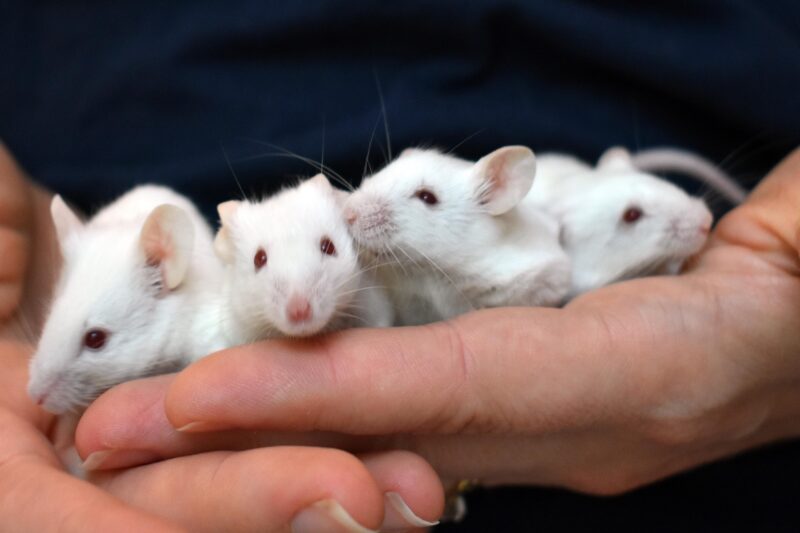
So you want to adopt a mouse? Here are some things to consider before adding a mouse, or better yet, mice to your family!
- Mice are very social creatures and it is usually best to keep them in groups so they can engage in their natural social behaviors.
- Some people keep pet mice in pairs or small groups.
- Consideration should be given when selecting the number and gender of pet mice.
- Unfamiliar males will tend to fight, so littermates are usually a better choice. While some male mice can live together, even siblings will fight aggressively if not given enough space. If you have two sibling male mice co-habiting, it’s imperative to make sure there is adequate space. A majority of novice mice owner keep males singularly for this reason.
- Avoid keeping male and female mice together as they will reproduce very quickly.
- When you are thinking of adopting, speak with a staff member at the adoption agency about the mice they have available, their genders and how they are currently housed.
Lifespan:
- Pet mice typically live between 1 and 3 years.
Housing:
- In most cases, a glass aquarium works best for housing pet mice. This ensures their safety and gives them plenty of space to roam around. It is also a great way for you to keep an eye on them and enjoy their behavior and activities.
- Wire cages can work if they are designed specifically to hold pet mice.
- Any enclosure you choose will need to be cleaned regularly, so plan to make that part of your regular routine. Daily spot cleaning and weekly deep cleaning with bedding changes works well. When deep cleaning, you can leave a bit of the old bedding in the enclosure. Mice mark their territory and they can become distressed if that scent is constantly removed.
- Aquariums will have ammonia build up quickly which can be harmful to your pet’s respiratory tract.
- Don’t wait for the cage or enclosure to begin to smell before cleaning.
- Be sure to keep their water bottles, bowls and other items clean as well.
- Paper bedding or aspen can be used as a bottom layer.
- Nesting material, such as tissue, soft paper towel or hay and a nest box which can be purchased or home made from a safe cardboard box. Be sure to remove metal, plastic or other hazardous materials.
Food and Water:
- Pellets formulated for pet mice or other small rodents such as hamsters provide the most well-rounded nutrition for your pet
- Mixed grain and seeds for small rodents can be added for variety, but should not replace pellets
- Additional fresh vegetables and fruits can be a fun way to add interest for your pet: greens apples and carrots are all nice occasional treats. Plain sunflower seeds can be given in small quantities as they are high in fat.
- Cooked pasta, whole grain bread or crackers are a nice treat in small quantities.
- Commercially made treats from pet stores are also a safe and fun way to add variety to your pet’s diet.
- Water – A water bottle with spout is best and should be changed with fresh water daily. Be cautious to not use chlorinated tap water.
Supplies:
- Wood blocks and houses
- Small cardboard boxes
- Ladders
- Cotton ropes
- Small willow balls
- Bowls for food
- Water bottle(s) with spout
- Shallow ceramic bowls for food
Grooming and Care:
- Pet mice will groom themselves regularly as they like to stay clean and owners do not need to bathe or clean their pet mice
- If you notice a pet mouse is not grooming as usual, it may be a sign of an underlying health or nutrition issue. Contact your veterinarian for guidance.
Fun Facts:
- A mouse’s tail is usually as long as it’s body!
- Mice can use their whiskers to detect changes in the temperature.
- They also use their whiskers to feel for any texture changes in the surface they are scurrying along.


